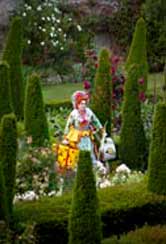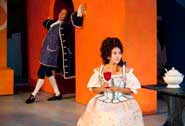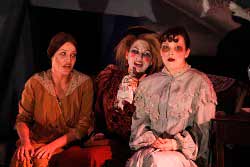|
Martinu Revisited
28 August being the 50th anniversary of the death of Bohuslav Martinu’s, so it’s time to dust off the scores, and take a well-deserved fresh look at a composer whose work has never quite made it into the core repertoire.
Hats off to both Garsington and GSMD for choosing two operas from his final year and demonstrating just what good entertainment they make.
Mirandolina

Conductor – Martin Andre
Director – Martin Duncan
Designer – Francis O’Connor
Choreographer – Steve Elias
Lighting – Bruno Poet
Mirandolina – Juanita Lascarro
Ortensia – Mary Hegarty
Deianira – Jean Rigby
Fabrizio – Daniel Norman
The Count of Albafiorita – Mark Wilde
The Cavaliere of Ripafratta – Geoffrey Dolton
The Marquess of Forlimpopoli – Andrew Slater
Garsington Opera16 June 2009
Mirandolina is a pretty and flirtatious innkeeper. She already has a couple of attentive suitors lined up, competing on rank and wealth. Thenext guest to arrive at the inn is the Cavaliere, a die-hard woman hater, and challenge not to be missed and slowly but surely he succumbs to Mirandolina’s wiles. The appearance of a pair of actresses, a little past their prime and posing as titled ladies further complicates the plot, which culminates in Mirandolina rejecting all her suitors in favour of a good looking servant, to whom she boldly proposes marriage.
Martin Duncan (director), Francis O’Connor (designer) and Steve Elias (choreographer) have made a thoroughly good show out of it: characters sharply drawn, a practical set and colourful costumes which emphasise the story-book nature of the plot, and some very neat footwork is executed on an upstairs-downstairs stage.
One thing you can say about Martinu is that he unstinting with his words – there are lots of them, cleverly balanced with his  orchestration, but nonetheless a serious test of a singer’s technique. Many congratulations to a strong acting cast who put over pretty much every word of Jeremy Sam’s new translation, rendering the surtitles superfluous. ``` orchestration, but nonetheless a serious test of a singer’s technique. Many congratulations to a strong acting cast who put over pretty much every word of Jeremy Sam’s new translation, rendering the surtitles superfluous. ```
Juanita Lascarro (Mirandolina), on stage for virtually the whole opera, looked dainty and coquettish and sang throughout with apparent ease. She was well matched by the curmudgeonly misogynist of Geoffrey Dolton. Mary Hegarty and Jean Rigby, as the two old-pros of the boards were absolutely hilarious and seemed to be having as much fun as their cavorting indicated.
The orchestra sounded lush and well disciplined under the baton of Martin Andre and the sun shone on the beautiful gardens. A memorable evening.
Martinu The Marriage
Guildhall School of Music & Drama
3 June 2009
Conductor – Clive Timms
Director – Alessandro Talevi
Designer – Madeleine Boyd
Lighting – Matthew Haskins
Podkolyosin – Duncan Rock
Stepan – Adam Torrance
Fyokla – Emily Steventon
Kochkaryov – Nicky Spence
Agafya – Rhona McKail
Arina – Hanna Hipp
Ivan – Jonathan Sells
Zhevakin – Daniel Joy
Anuchkin – Leonel Pinheiro
Photo credit Nobby Clarke
The Marriage dates from about a year earlier than Mirandolina, and was written as an opera for TV, with almost as many jokes in the orchestration as there are in the story, superbly put across by the orchestra under Clive Timms.
Sensibly, director Alessandro Talevi kept the scale very small, using just a proportion of the Guildhall stage. This was by far the best production that I have seen from him, concentrating on the essentials in telling the story and bringing out the humour very effectively.
Most of the cast are close to completing their 2-year opera course and their singing and acting was as polished as one would expect. Where words didn’t quite get across their meaning was entirely clear from the actions and expressions.
All deserve applause, but I would single out Emily Steventon as the marriage broker who seems to have a real flare for comedy, and the trio of unlucky suitors Jonathan Sells, Daniel Joy and Leonel Pinheiro, gloriously funny at every turn.
This short piece was the first half of a double bill continuing with Rossini’s La cambiale di matrimonio, which sadly proved less rewarding and I will not comment further.
Serena Fenwick
|

